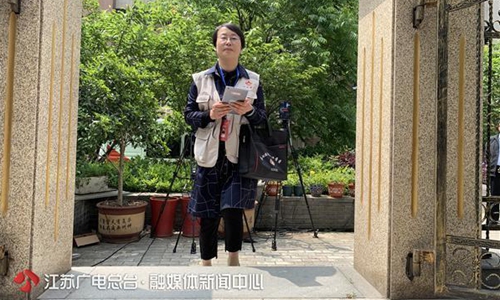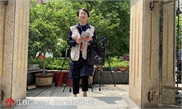Once-in-a-decade census starts head count
Offers fundamentals for China’s further development planning: experts

A census taker takes a electronic device during her work in Zhenjiang, East China's Jiangsu Province. Photo: screenshot of Jiangsu Television
Across thousands of residential compounds in Beijing, a knock at the door has become common across the capital as it kicked off the seventh national census on Sunday.
The national census, held every 10 years, takes place this year at a critical moment as the country's policymakers will soon review China's 14th Five-Year Plan (2021-25) in late October, and an accurate population survey will provide key resources for the government's planning on social development and livelihoods, demographic experts said.
Late on Saturday afternoon, two census workers arrived at a residential compound in Beijing's Chaoyang district and asked residents to fill out forms for the census. A wide range of individual and household information would be collected, including names, ages, ID numbers, education level, marriage status and housing situation, the Global Times learned. The two census takers were just two of the army of around 7 million census counselors and census takers. The census will enable a full understanding of the total population, its structure and major characteristics, and what are the most rapidly changing factors of Chinese society over the past decade.
Compared to the door-to-door census that took place a decade ago, the colossal population survey this year is empowered with internet-based technologies such as cloud computing and services and online registration through QR codes, reflecting how the internet has reshaped Chinese society.
Great significance
China conducted its first census in 1953. The sixth census in 2010 showed that the country's population had grown from 1.27 billion in 2000 to 1.37 billion with an annual average growth rate of 0.57 percent, according to the National Bureau of Statistics. The number of people above 60 years old was about 177.6 million, accounting for 13.3 percent of the total population.
"The census this year is extremely important, especially as our population is undergoing drastic changes. Overall population growth has been slowing in a rapidly aging society, the workforce is shrinking and there are vast changes in population distribution," Zhai Zhenwu, president of the School of Sociology and Population Studies at the Renmin University of China, told the Global Times on Sunday.
One of the most significant changes in Chinese society over the past decade was in demographic sector, Zhai said, noting that a full understanding of the comprehensive size and diversity of the country's population is essential for planning for the next decade.
As 2020 also marks a milestone as China aims to achieve its goal of building a moderately prosperous society in all aspects and will also lay out a blueprint for economic and social targets for the next five years, the population survey and information collection of basic national conditions and fundamental strength undoubtedly are of important strategic significance, the expert noted.
This year's census comes after China has put vigorous efforts into containing the coronavirus epidemic. Still, the routine epidemic prevention work brings up challenges for the census workers as local authorities undertake different data collection approaches in accordance to different risk levels for coronavirus outbreaks.
To facilitate the registration, individuals can use mobile devices to declare personal and household information by scanning a QR code. The census will include the ID numbers of individuals for the first time, which some demographic experts said will be important to avoid missed calculation and double counting, especially for the migrant population.
"The use of ID numbers in the census will make the data more accurate compared to previous censuses," demographer He Yafu told the Global Times on Sunday.
As the country has implemented the second-child policy since 2016, it is expected there will be fewer instances in which families hide a third or fourth child. This will also make the survey more accurate, He said.
Privacy protected
The full-scale data collection through electronic devices will enable the data to be uploaded to a national database. Mobile and end devices have strict data encryption and desensitization technologies to ensure data security and personal privacy, census workers said.
"The major difference between the seventh national census and the sixth national census a decade ago is the use of paper," a member of staff at the Beijing census bureau, who preferred not to be identified, told the Global Times on Sunday.
Papers are still used this year but all residents are encouraged to scan a QR code with their smartphone or tablet, fill out the information online and upload it to the cloud for the census, she said.
In response to some residents' concerns over information privacy, the Beijing census office said the protection of personal information will be ensured under a strict confidentiality agreement.
All information will be collected with encrypted transmission technology, with the information encrypted and uploaded directly to the cloud, and all equipment used by the census takers will have to be handed in, according to the office.
Rapid changes
Before the once-a-decade census takes place, some media reports pointed out in 2019 that two provinces - South China's Guangdong and East China's Shandong - both recorded populations of over 100 million, but the three Northeast China provinces saw negative population growth with significant outflow, which signals an unbalance in regional development.
"The census will record a shrinking population in the northeastern regions this year, because of a low fertility rate," He said, noting that Guangdong as well as the Yangtze River Delta regions are the main locations for incoming flows, which will see surging population growth compared to the previous census.
Residents from outside the Chinese mainland will also be registered, a staff employee of the Census Office in Beijing's Chaoyang district, where many foreigners live, confirmed to the Global Times. "All foreign residents in the district should fill in the form, regardless of the duration and type of their visas," she said.
The census takers will be accompanied by English interpreters for foreigners, she explained. If there are other difficulties or needs, they can apply to the census takers for interpreters in other languages or specialized technicians, the employee noted.
The sixth census showed that South Koreans, Americans and Japanese were ranked the top three among 593,832 foreigners surveyed nationally, according to the official database.





